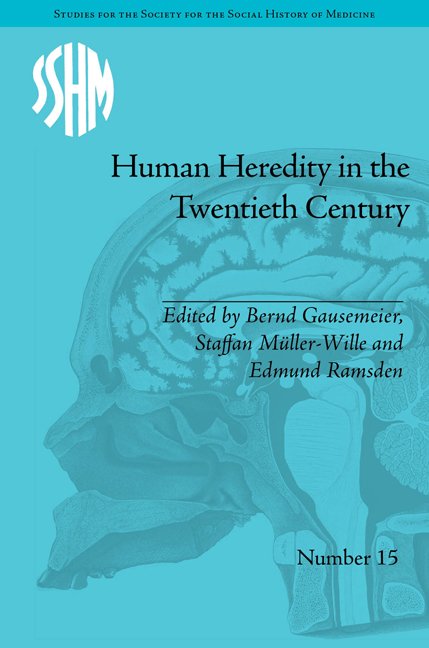Book contents
- Frontmatter
- Contents
- Acknowledgements
- List of Contributors
- List of Figures and Tables
- Introduction: Human Heredity in the Twentieth Century
- Part I Constructing Surveys of Heredity
- Part II Blood and Populations
- Part III Human Heredity in the Laboratory
- 8 From Agriculture to Genomics: The Animal Side of Human Genetics and the Organization of Model Organisms in the Longue Durée
- 9 Cereals, Chromosomes and Colchicine: Crop Varieties at the Estación Experimental Aula Dei and Human Cytogenetics, 1948–58
- 10 Putting Human Genetics on a Solid Basis: Human Chromosome Research, 1950s–1970s
- Part IV Understanding and Managing Disease
- Part V Reconstructing Discipline(s)
- Notes
- Index
10 - Putting Human Genetics on a Solid Basis: Human Chromosome Research, 1950s–1970s
from Part III - Human Heredity in the Laboratory
- Frontmatter
- Contents
- Acknowledgements
- List of Contributors
- List of Figures and Tables
- Introduction: Human Heredity in the Twentieth Century
- Part I Constructing Surveys of Heredity
- Part II Blood and Populations
- Part III Human Heredity in the Laboratory
- 8 From Agriculture to Genomics: The Animal Side of Human Genetics and the Organization of Model Organisms in the Longue Durée
- 9 Cereals, Chromosomes and Colchicine: Crop Varieties at the Estación Experimental Aula Dei and Human Cytogenetics, 1948–58
- 10 Putting Human Genetics on a Solid Basis: Human Chromosome Research, 1950s–1970s
- Part IV Understanding and Managing Disease
- Part V Reconstructing Discipline(s)
- Notes
- Index
Summary
In the post-World War II era one technique raised particularly high hopes to advance the study of human heredity. This was the technique of human karyo-typing, which made it possible to visualize and analyse human chromosomes. Following this tool and the practices that accompanied it, we can gain insights into a broad range of developments and discussions around human heredity and the cultural concerns in which they were embedded. Chromosome research has been largely neglected in historical accounts of post-war genetics, in which molecular biology has taken much of the limelight. This essay aims at redressing this situation arguing that human chromosome research was a high-profile subject that responded to urgent questions and attracted much funding and attention at the time. It suggests that the history of human cytogenetics provides a crucial chapter to understand how genetics has gained its dominant position in the late twentieth and early twenty-first century and points to important continuities to current genomic practices. The essay will review the political and scientific concerns that propelled the study of human cytogenetics after World War II and reconstruct the hopes and expectations that were put into the new techniques to visualize human chromosomes. It will then survey some of the fields–from radiobiology and cancer research to medical genetics, gender testing, criminology and worldwide population studies – in which karyotyping made an entry, providing new answers to existing questions and opening up new areas of investigation and debate.
- Type
- Chapter
- Information
- Human Heredity in the Twentieth Century , pp. 141 - 152Publisher: Pickering & ChattoFirst published in: 2014



